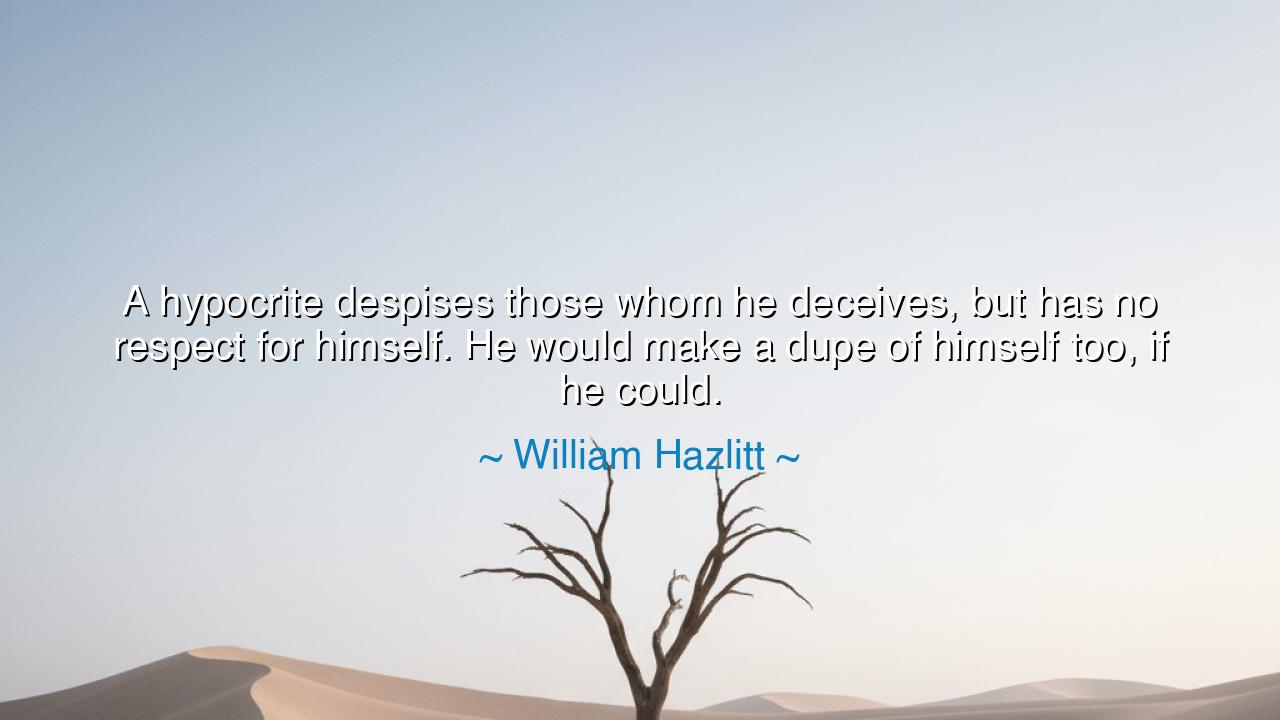
A hypocrite despises those whom he deceives, but has no respect
A hypocrite despises those whom he deceives, but has no respect for himself. He would make a dupe of himself too, if he could.






The English essayist William Hazlitt once declared: “A hypocrite despises those whom he deceives, but has no respect for himself. He would make a dupe of himself too, if he could.” These words cut sharper than iron, for they reveal the true nature of the hypocrite. Such a man lives by falsehood, showing one face to the world and hiding another in the shadows of his heart. Yet Hazlitt teaches us that hypocrisy is not only a betrayal of others, but a deeper betrayal of the self. For how can one respect oneself when one’s life is built upon deception?
The origin of these words lies in Hazlitt’s fierce hatred of insincerity. Writing in the nineteenth century, he lived in an age of public manners and polished masks, where reputation was prized often above truth. Hazlitt, who cherished honesty and authenticity, saw hypocrisy as the most poisonous of vices. It is not merely lying—it is living a lie. It despises its victims, for to deceive another is to assume superiority over them. Yet, paradoxically, the hypocrite cannot escape his own trap; he would fool even himself if it were possible, showing that his condition is one of contempt without end.
The ancients too spoke of this. The Stoics condemned the false man, who speaks of virtue but seeks only pleasure or power. The Scriptures thunder against those who “wash the outside of the cup while the inside is filthy.” In every age, the hypocrite has been a figure both pitied and despised: pitied because he is enslaved by appearances, despised because he corrupts trust and desecrates truth. To wear a mask may deceive for a season, but in time the mask grows heavy, and the face beneath is disfigured by shame.
Consider the tale of Alcibiades, the Athenian statesman of the fifth century before Christ. Brilliant in speech, charming in presence, he persuaded Athens to great ventures. Yet beneath his noble words lay ambition and shifting loyalty. He betrayed Athens to Sparta, then Sparta to Persia, then returned again when fortune turned. In the end, he deceived all and was despised by all. His hypocrisy, dazzling though it seemed, brought ruin not only to his city but to his own name. Like Hazlitt’s hypocrite, Alcibiades showed contempt for those he deceived, yet in truth he had destroyed his own honor long before others judged him.
The lesson is clear: to live in hypocrisy is to wage war against oneself. One cannot honor both truth and falsehood, both mask and face. The hypocrite seeks to stand tall among men, but his soul stoops lower with each deceit. And though he scorns those he misleads, in secret he scorns himself more. Thus Hazlitt’s wisdom shines: the hypocrite would trick even his own heart if he could, but the soul cannot lie to itself forever.
Practical actions must follow. First, cultivate honesty in thought and deed. Do not say one thing and do another, for this division breeds decay. Second, let your actions match your words, so that your life is one whole, not a mask upon a mask. Third, seek truth within yourself daily—ask if your motives are pure, if your speech aligns with your heart. If hypocrisy has taken root, uproot it quickly, for the longer it grows, the deeper it poisons.
Therefore, O listener, guard your integrity as you would guard your very life. Respect for oneself comes not from applause, nor from deceiving others, but from the quiet knowledge that you have walked in truth. The hypocrite may rise for a season, but his fall is inevitable, for a house built on lies cannot stand. Let Hazlitt’s words be a warning: deception is contempt, and hypocrisy is self-destruction. Choose instead the path of sincerity, and your soul will stand unbroken, unashamed, a light to those who walk after you.






AAdministratorAdministrator
Welcome, honored guests. Please leave a comment, we will respond soon